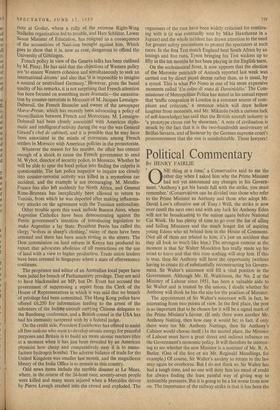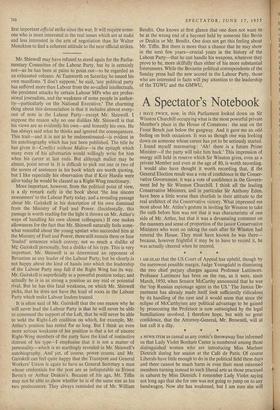Political Commentary
By HENRY FAIRLIE NE thing at a time,' a Conservative said to me the other day when I asked him why the Prime Minister had not yet announced any changes in his Govern- ment. 'Anthony's got his hands full with the strike, you must remember.' (Conservatives can be divided into those who refer to the Prime Minister as Anthony and those who adopt Mr. David Low's offensive use of Tony.) Well, the strike is now over (until the next one) and with any luck Sir Anthony Eden will not be broadcasting to the nation again before National Cat Week. He has plenty of time to go over the list of ailing and failing Ministers and the much longer list of aspiring young Edens who sit behind him in the House of Commons. (Not all of them are related to him; it's just an accident that they all look so much like him.) The strongest rumour at the moment is that Sir Walter Monckton has really made up his mind to leave and that this time nothing will stop him. If this is true, then Sir Anthony will have the opportunity (without having to create it) of substantially reconstructing his Govern- ment. Sir Walter's successor will fill a vital position in the Government. Although Mr. H. Watkinson, the No. 2 at the Ministry of Labour since 1951, has been a valuable aide to Sir Walter and is trusted by the unions. I doubt whether Sir Anthony will think he has the size for the position of Minister.
The appointment of Sir Walter's successor will, in fact, be interesting from two points of view. In the first place, the post is so important that to be chosen for it will be a signal mark of the Prime Minister's favour. (If only there were another Mr. Anthony Nutting, then how easy it would be; in fact, if only there were ten Mr. Anthony Nuttings. then Sir Anthony's Cabinet would choose itself.) In the second place, the Minister of Labour must have a great direct and indirect influence on the Government's economic policy. It will therefore be interest- ing to see whether the new Minister is a nominee of Mr. R. A. Butler. (One of the five or six Mr. Reginald Maudlings, for example.) Of course. Sir Walter's anxiety to return to the law may again be overborne. But I do not think so. Sir Walter has had a tough time, and no one will deny him his weed of credit for always finding the least painful way of giving way to irresistible pressures. But it is going to be a lot worse from now on. The importance of the railway strike is that it has been the first important official strike since the war; It will require some- one who is more interested in the real issues which are at stake and less interested in the arts of negotiation than Sir Walter Monckton to find a coherent attitude to the next official strikes.
Mr. Shinwell may have refused to stand again for the Parlia- mentary Committee of the Labour Party, but he is certainly not—as he has been at pains to point out—to be regarded as an exhausted volcano. At Tamworth on Saturday he issued his own manifesto. 'I don't suppose,' he said, 'any political party has suffered more than Labour from the so-called intellectuals. the persistent attacks by certain Labour MPs who are profes- sional journalists, and the weakness of some people in author- ity—particularly on the National Executive.' The charming thing about this denunciation is that it includes almost every- one of note in the Labour Party—except Mr. Shinwell. I suppose the reason why no one dislikes Mr. Shinwell is that his views are so evidently his own—and honestly his own. He has always said what he thinks and ignored the consequences. This trait—and it is not to be underestimated—is evident in his autobiography which has just been published. The title he has given it—Conflict without Malice—is the epitaph which many even of his adversaries would willingly write for him when his career at last ends. But although malice may be absent, point never is. It is difficult to pick out one or two of the scores of sentences in his book which are worth quoting, but I like especially his observation that if Keir Hardie were alive today he would be classed as a Right-Wing reactionary.
More important, however, from the political point of view, is a sly remark early in the book about 'the less sincere newcomers' to the Labour Party today, and a revealing passage about' Mr. Gaitskell in his description of his own dismissal from the Ministry of Fuel and Power. (Incidentally, this passage is worth reading for the light it throws on Mr. Attlee's ways of handling his own closest colleagues.) If one makes allowances for-the fact that Mr. Shinwell naturally feels some- what resentful about the young upstart who succeeded him at the Ministry of Fuel and Power, there still remain three or four `loaded' sentences which convey, not so much a dislike of Mc. Gaitskell personally, but a dislike of his type. This is very important. Mr. Shinwell is as determined an opponent of Bevanism as any leader of the Laboui Party, but he clearly .is not happy about the kind of hands into which the leadership of the Labour Party may fall if the Right Wing has its way. Mr. Gaitskell is superficially in a powerful position today; and actually he is in as strong a position as any real or potential rival. But he has this fatal weakness, on which Mr. Shinwell picks, that he does not have the kind of roots in the Labour Party which make Labour leaders trusted.
It is often said of Mr. Gaitskell that the one reason why he will never lead the Labour Party is that he will never be able to command the support of the Left, that he will never be able to weld the Right-Left coalition on which, for example, Mr. Attlee's position has rested for so long. But 1 think an even more serious weakness of his position is that a lot of sincere Right-Wing members of the party have the kind of instinctive distrust of his type—I emphasise that it is not a matter of personality—which is so startlingly revealed in Mr. Shinwell's autobiography. And yet, of course, power counts, and Mr. Gaitskell can feel quite happy that the Transport and General Workers' Union is again to have as General Secretary a man whose credentials for the post are as indisputable as Ernest Bevin's or Arthur Deakin's. Because of his age, Mr. Tiffin may not be able to show whether he is of the same size as his two predecessors. They always reminded me of Mr. William Bendix. One knows at first glance that one does not want to be at the wrong end of a bayonet held by someone like Bevin or Deakin or Mr. Bendix. One does not get this feeling about Mr. Tiffin. But there is more than a chance that he may show in the next few years—crucial years in the history of the Labour Party—that he can handle his weapons, whatever they prove to be, more skilfully than either of his more substantial forerunners. While the Bevanite political correspondents of the Sunday press hail the new accord in the Labour Party, those who are interested in facts will pay attention to the leadership of the TGWU and the GMWU.



































 Previous page
Previous page